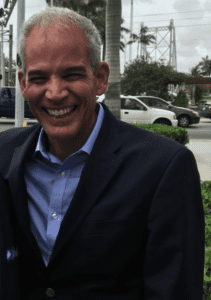
We’ve heard this repeatedly: one out of every five adults in the United States struggles with a mental health affliction of some sort. Those afflicted, however, are more than statistics: they are our friends, neighbors, co-workers, and family members.
In our family it was my older brother Pedro who suffered from mental health issues his entire adult life until his passing a year ago. Since I was a young boy, I witnessed Pedro’s struggles with substance abuse, incarceration, institutionalization and even periods of homelessness. At first his crises were intermittent but eventually presented every two years or so; stabilization took longer and longer with each episode and in some cases up to ten months.
It was painful to see my parents struggle to find help for Pedro; they knocked on the door of every crisis unit in town and in their broken English and with limited knowledge of the judicial system resorted to the Baker Act far too many times to remember. Thankfully there were also periods of stability but Pedro lived nothing that resembled a normal life; no spouse, children or meaningful employment.
As the years passed I actively assisted my parents and eventually became my brother’s primary caretaker after my mom passed and my dad became ill.
Because of these experiences I understand the struggles of so many families that are impacted by mental health affliction and thus offer the following observations:
Families of those afflicted by mental health issues are the first and undeniably the best line of support, and we must do more to assist them. This assistance is critical especially during a crisis episode because family members often become the targets of their loved ones behavior and aggression typically blaming the family for their predicament.
Our judicial intervention process, more commonly known as the Baker Act in Florida, is painstaking and taxing on the patient but on the family as well; the end result is usually 72 hours of involuntary psychiatric care before the patient is eligible for discharge. Anyone who has gone through this understands that 72 hours isn’t enough to stabilize someone suffering a psychiatric crisis. While recent reforms have addressed many of these issues, more is needed to make this process less intimidating for the family while balancing the rights and immediate needs of the family member.
Reform is needed in the way Crisis Intervention Units operate and how they are reimbursed for their services. CIU’s do incredible and consequential work, but often times carry out their efforts unsure of the source and amount of compensation. Furthermore, benefits for crisis intervention typically cover a very short period of time (typically one week) resulting in a revolving door of admissions, discharges and readmissions which does little to address the patients’ needs and leaves struggling families with little recourse, significant frustration and in some cases the prospective of large bills.
Finally, families (and patients) would benefit from centralized mental health records. While I recognize any such records system must have the appropriate privacy safeguards, I can’t begin to describe how exhausting it is to repeat the same background, describe the same symptoms, medical history, provide a list of medications over and over to what would appear to be an endless number of psychiatrists, psychologists, nurses, social workers, or judges and police officers during each crisis. Not only is this painful for family members, but also consumes precious limited time. A centralized records system can reduce the time necessary to provide the patient with the help needed to begin the path towards recovery, not to mention relive this burden on the families. Centralized records are even more critical in cases where the family is not available or engaged in the caretaking.
Undoubtedly mental health issues are very difficult on the patient but on the families as well. We need to do more to assist these families who are the first and best line of support.
In conclusion, I want to thank the countless mental health professionals (you know who you are) who assisted my brother and our family over the past 40 plus years. There are many unsung heroes out there at the front lines of mental health illness and I salute them and thank them for their tireless efforts.
Alex Penelas served as a two-term Mayor of Miami-Dade County from 1996 to 2004. Alex’s career in public service began in 1987 when he was elected to the City Council of Hialeah before successfully running for a County Commission seat in 1990, becoming the youngest County Commissioner in history. During his eight years as mayor, Alex focused on implementing robust solutions for early education, public transportation, and homelessness. In fact, it was exactly 25 years ago that Alex sponsored the ordinance creating the Miami Dade County Homeless Trust, a program that continues to serve our community’s homeless today. A proud father of three, Alex now lives in Miami Lakes with his wife, Lilliam and their youngest daughter, Alexandra. If you would like to reach out to Alex, feel free to do so through his personal email: Alex.Penelas18@gmail.com







Comments are closed.